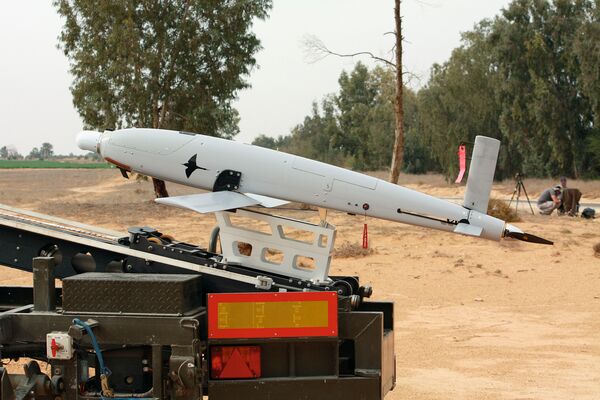- About
- Intara
- Capabilities
- Advisory
- Resources
- News
- Store
Elbit Systems develops Find-and-Strike control concept
19 September 2023
by Sam Wise & Akshara Parakala


Elbit Systems' SkyStriker loitering munition mounted on its rail launcher. (Elbit Systems)
Elbit Systems has developed an operating concept that provides a single point of control for its Skylark unmanned aerial vehicle (UAV) and SkyStriker loitering munition.
The company displayed its Find-and-Strike (FAST) Capsule concept at the DSEI 2023 defence exhibition in London. FAST is designed to enable a single operator to launch a Skylark UAV from a catapult, operate it from a ground control station (GCS), and once a target has been acquired, launch a SkyStriker from the same launcher and control it from the same GCS. According to Elbit, this will shorten the ‘sensor-to-shooter' loop.
Target information can be processed through the Skylark 3 and then sent to the common GCS, the data is then fed to the SkyStriker. Only one operator is required to perform the mission.
Speaking to Janes , Elbit Systems vice-president of marketing and business development for unmanned aircraft system (UAS), Amir Bettesh, said the FAST Capsule is being pitched to existing Skylark and SkyStriker customers. He added that Elbit has received interest from customers, some of whom are not operators of both types.
Heron TP makes maiden German flight
16 May 2024
by Gareth Jennings


The GHTP lifts off from Jagel for its maiden flight in German airspace. (IAI)
The Luftwaffe has flown the first of its leased Israel Aerospace Industries (IAI) Heron TP unmanned aircraft systems (UASs) on its maiden flight in German airspace on 15 May.
Announced by the Bundeswehr, Airbus Defence and Space as the lead contractor for the programme, and IAI, the milestone saw the medium-altitude long-endurance (MALE) unmanned aerial vehicle (UAV) operating out of its future home station of Jagel (also known as Schleswig Air Base) in the far north of Germany.
Known as the German Heron TP (GHTP), the UAS was awarded a type certificate by the German Military Aviation Authority in late 2022, at which time it was operated out of an undisclosed location in Israel.
The GHTP is intended to bridge the gap between the retirement of the earlier Heron 1 UAS and the introduction of the new European MALE UAS known as Eurodrone, with Airbus Defence and Space operating five air vehicles out to 2027.
Brazil conducts first flight of re-winged P-3AM Orion
16 May 2024
by Victor Barreira


A Brazilian Air Force P-3AM Orion. Three aircraft are to be upgraded with new wings. (Airbus Military SAS)
The first re-winged Brazilian Air Force Lockheed P-3AM Orion maritime patrol aircraft (MPA) flew on 2 May, the service announced on 13 May, a major step towards improving the P-3AM fleet's readiness rate.
Elements of the wing that were replaced during the rebuild include the top coverings, front and rear spars, and the upper panels of the central wing and fuselage structures.
Brazilian manufacturer Akaer has delivered two additional sets of wings to the Brazilian Air Force, which are being installed in another two aircraft at the Galeão Aeronautical Material Park. The project is scheduled to conclude in October 2024, Akaer said in an announcement. Whether or not Brazil intends to upgrade the P-3AM fleet beyond the three deliveries has not been publicly disclosed.
On 25 October 2018 Akaer was awarded a contract to rebuild the main wings of three Orion MPAs, the company said.
Eurodrone passes delayed preliminary design review
16 May 2024
by Gareth Jennings


A mock-up of the Eurodrone seen at the Paris Airshow in 2023. The project has now passed its preliminary design review, paving the way for its critical design review later in the year. (Janes/Gareth Jennings)
The Eurodrone project has passed its delayed preliminary design review (PDR), the lead contractor Airbus Defence and Space (DS) announced on 16 May.
The milestone was completed alongside programme partners Dassault and Leonardo, as well as the Organisation for Joint Armament Cooperation (OCCAR).
“The PDR proves that the initial design of the aircraft has consistently matured, paving the way to proceed with the detailed design,” Airbus DS said, adding that it is the outcome of different technical assessments and evaluations.
These, the company noted, included wind tunnel testing to confirm the aerodynamic configuration of the Eurodrone, the overall design to ensure demonstration of operational capability, and the validation of a fully representative ‘digital twin' design.
With its successful PDR, the project will now enter into the critical design review (CDR) phase, which will represent the final step and closure of architecture and system design.
Elbit Systems has developed an operating concept that provides a single point of control for its Sky...
Latest Podcasts
The value of OSINT for intelligence sharing
In this episode Harry Kemsley and Sean Corbett are joined by Phil Ritcheson Ph.D. to discuss why intelligence sharing is now more important than ever. They discuss the growing need for allied and partnership and how by using open sources facilit...
Listen nowJanes Case Studies
Using Janes Intara to build a common intelligence picture: Russian build up on the Ukrainian border
View Case StudyNews Categories
 Air Details
Air Details